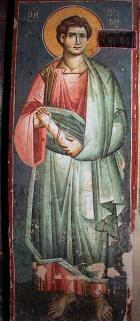Saint John the Baptist 1/20/2013
Because John's main role in his life was played out on the day of the Theophany, the Church from earliest times dedicated the day following Theophany to his memory. To this feast is also linked the incident with the hand of the Forerunner. The Evangelist Luke desired to remove the body of John from Sebaste, where the great prophet was beheaded by Herod, to Antioch, St. Luke's place of birth. He succeeded though, in acquiring and translating only one hand, which was preserved in Antioch until the tenth century after which it was transferred to Constantinople from where it disappeared during the time of the Turks. Feasts of St. John are celebrated several times throughout the year, but this day, when Assembly in his honor is celebrated by the Christians, seems to express the most presence of the Forerunner in the life of the Church on the earth. The day after Theophanyin the orthodox sinaxsar few miraculous events connected with the saint relics of John the Baptist are presented to support the love and faith of the people of God toward the unspeakable Forerunner and Baptist of our Lord. Among the Gospel personalities who surround the Savior, John the Baptist occupies a totally unique place by the manner of his entry into the world as well as by the manner of his life in this world, by his role in baptizing people for repentance and for his baptizing the Messiah and, finally, by his tragic departure from this life. He was of such moral purity that, in truth, he could be called an angel (messenger) as Holy Scripture calls him rather than a mortal man. St. John differs from all other prophets especially in that he had that privilege of being able, with his hand, to show the world Him about Whom he prophesied. It is said that in Antioch every year on the feast of the saint, the bishop brought the hand of St. John before the people. Sometimes the hand appeared open and other times the hand appeared clenched. In the first case it signified a fruitful and bountiful year and, in the second case, it meant a year of unfruitfulness and famine.
